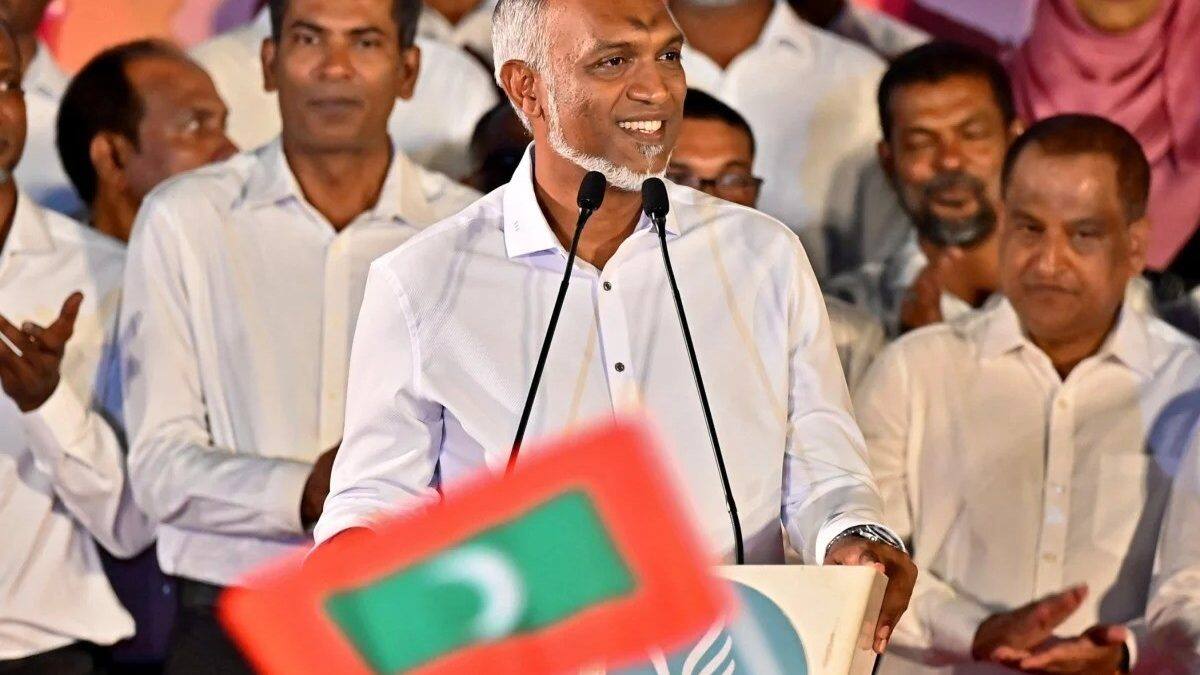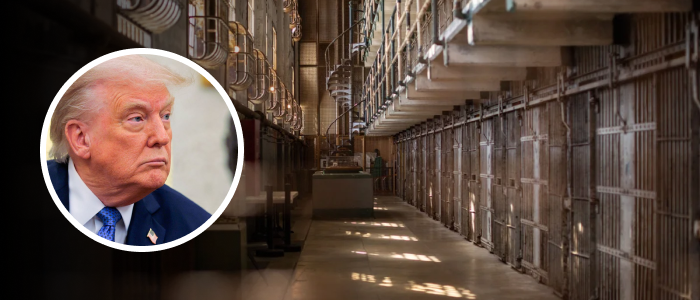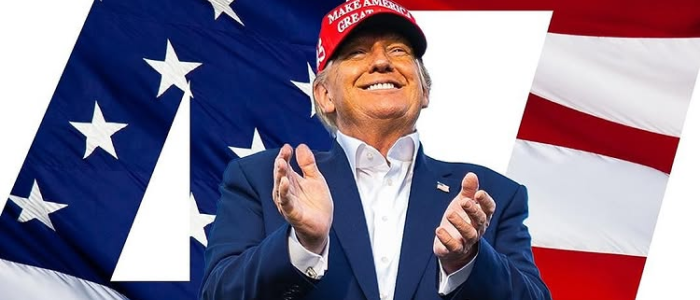Even as common neighbours, India and Sri Lanka have signed what possibly is the first bilateral defence cooperation MoU of the kind in South Asia; Maldivian President Mohamed Muizzu seemed to have revived his early plans to usher in another extra-regional power in the form of Turkey. After obtaining three of the promised six Turkish drones for aerial surveys of the vast seas surrounding the atoll nation during his maiden overseas foreign visit, Muizzu has now obtained a gift of an old warship from President Recep Tayyip Erdoğan’s government in Ankara. Media reports, quoting Turkish defence ministry sources, have claimed that the Dogan-class fast-attack missile boat, GCG Volkan (P-343), has been refurbished and will be handed over to the Maldives National Defence Force (MNDF) before June.
Training for Maldivian personnel has already begun in Turkey, and there will be additional training when it arrives in Maldivian waters to be handed over. According to these reports, the Dogan-class FAC, designed by German shipbuilder Lürssen Werft, marked a significant milestone in Turkish naval modernisation, being the first platform in the nation’s fleet to integrate the US-designed Harpoon anti-ship missile system. The ship thus offers over-the-horizon strike capabilities and high lethality in maritime engagements.

As may be recalled, Turkish drones were aimed at replacing the continued deployment of India-aided fixed-wing Dronier aircraft, flown by Indian military pilots in the absence of MNDF counterparts who did not take wings, as expected. Of course, after a series of high-level meetings initiated by President Muizzu and Indian Prime Minister Narendra Modi at their first meeting, this one in Dubai, the Dornier and also an Indian helicopter are back in action, flown by civilian pilots from India, with reportedly restricted use for evacuating flood victims and critically ill persons from distant atolls and islands. However, what Muizzu could not achieve one way or the other was to replace the closest Indian neighbour as the near-so sole supplier of staples, including rice, sugar and wheat flour, by importing them wholesale from distant Turkey.
The intervening Houthi attacks on the commercial shipping fleet in the Red Sea made the alternate circuitous route even more uneconomical. In the end, India continues to supply the staples and also medicines, which Muizzu wanted to import from Europe or the US, which is even more distant from Maldivian shores. Now the social media joke doing the rounds in the Maldives is how well Muizzu is going to ‘defend’ the nation’s sovereignty and territorial integrity (but from whom?) and both India and Sri Lanka would have to rush all their naval assets to face off the ‘threat’ to their sovereignty, instead.
P-343 is said to be longer and older than the India-gifted and refitted vessel, Huravee, that has been in the service of the MNDF for years now. Unlike the Turkish vessel, this one is not a missile-loaded attack craft. Some veterans claim even if not now, the Turkish vessel could be fitted with missiles – again, to target who? Overnight threats Jokes apart, questions are being asked about the need for expanding the MNDF coast guard wing or creating a new naval wing, which is what attack craft of the Turkish kind serve, that too in the midst of the economic crisis of the past year.
If still the current dispensation anticipated overnight external threats to national security, which is where an attack craft of the kind has use, then it should have taken the nation into confidence. The argument is that at least Parliament’s 241 National Security Committee should be taken into confidence. If it is only an internal threat, say, of terrorism, and not a rebellion within the MNDF, then a naval craft serves no purpose – and could become a sitting duck for the attackers to make a point, if any.
Again, the 241 committee should come into the picture. That’s what the previous Solih government did when Muizzu’s mentor and then-political boss, former President Abdulla Yameen, expanded the scope of his motivated ‘India Out’ campaign. Having demanded the withdrawal of the two Indian air machines and their pilots at the end of his presidency (2013-18), Yameen, under the Solih dispensation, claimed that the Indian-funded UTF coast guard harbour on the Uthuru Thila Falhu Island was instead aimed at hosting an Indian naval base.
Though Yameen as president had sought the harbour, when voted out, his attitude towards the northern neighbour changed overnight. And when the Opposition stalled parliamentary proceedings for days together, then-President Mohamed Ibrahim Solih cleared a proposal for all members of the 241 committee, sworn to secrecy, to read the UTF agreement with India but without taking down notes or making a copy. The initial silence that overwhelmed after panel members had read through the agreement was broken when non-MPs in Yameen’s camp and journalists supportive of him would not stop.
Some of them are at present Parliament members, representing the Muizzu-led ruling Progressive National Congress (PNC), a creation of Yameen. Real imaginary Through all these, Muizzu has been sending out confusing messages/signals, which in turn seem to flow from a confusing and at times contradictory assessment of national security, real and imaginary. The Maldives, even with the Turkish craft, cannot really fend off external security threats to the nation’s territorial integrity across the vast EEZ, even if it does not really threaten sovereignty.
If the government still aimed at using such vessels for tackling massive drug smuggling to the Maldives or through Maldivian waters, it’s like deploying a bulldozer to swat a fly. In the contemporary context, it’s like China deploying submarines to reportedly tackle Somali pirates a decade and more back. The real intention, including port calls at Sri Lanka’s Colombo, was to test the unique viscosity of the Indian Ocean waters.
The Maldives is already a member of the Colombo Security Conclave (CSC), along with India, Sri Lanka, Mauritius and more recently Bangladesh as members, and Seychelles as an ‘observer’. Though Mauritius had chosen the Male session of the annual conclave in 2022 to become a full-fledged member before Muizzu’s time, his government chose to boycott the Mauritius session, later claiming that they did not have proper briefing by the outgoing Solih dispensation. In all fairness, the Maldives participated in the next session.
Of course, the CSC addresses only non-traditional security concerns, beginning with human security. IOR ambitions Thus the question arises as to what purpose two Turkish drones earlier and a Turkish attack craft now serve the Maldives, where low population spread across the vast Indian Ocean, in 1,200 inhabited islands, also affects personnel demands of the MNDF. Does it mean that on a future day, the government would clear a proposal for hiring non-Maldivians for ‘national security duties’ – if that is what it takes? In turn, which is the likely country from which the government would rope in experienced naval personnel or veterans? It cannot be India, Sri Lanka or any other nation in the region.
Zeroing in on Turkey itself is a real possibility, but that is for another day – just as the likelihood or otherwise of obtaining missiles for the new vessel. In short, Ankara’s gift of military assets in such a short span points only to the possibility of Turkey wanting to develop strategic interest in the Indian Ocean Region (IOR). The Maldives under Muizzu may only provide the base for President Erdoğan to launch his ambitious project if it is only a beginning.
If so, it is going to upset the security equilibrium in the IOR beyond past imagination and consequent preparations. Already, the US has been around in these parts in the form of the Diego Garcia base. China, as the new entrant to the superpower game, may not have got a military foothold but has Sri Lankan territory under its ‘strategic control’, in Hambantota.
Indications and, by implication, the India-Sri Lanka defence cooperation MoU is believed to be aimed at securing the region against visible ‘Chinese expansionism’. Yet, China still wanted free passage and port-call facilities for its ‘spy ships’, in Sri Lanka and Muizzu’s Maldives. Incidentally, at the peak of Muizzu’s bountiful hate speech against India on his return from the state visit to China, in mid-January 2024, New Delhi began fast-tracking work on the ‘INS Jayatu’ base on Minicoy Island, which some of the Maldivian governments from the days of President Maumoon Abdul Gayoom had claimed as theirs.
But no Maldivian per se expects any threat from India for the foreseeable future. Instead, it makes sense for them, too, that Indian strategic depth, military strength and political will all are required to secure the IOR for the regional nations, especially from extra-regional powers that are out to covet one or more of them, in terms of their own geo-strategic ambitions and tit-for-tat competition. There is clarity among IOR nations in the region that they just cannot manage external threats and security – now or ever.
Quad sense The argument that after the India MoU, signed during Prime Minister Modi’s Sri Lanka visit this month, Colombo will be pressured to sign up for the US-led Quad does not make sense, for a nation like the Maldives to quiz around. India itself has clarified more than once that it would not be a part of security and military aspects of Quad. With the result, the US created AUKUS with Australia and the UK to address those strategic and security concerns.
If so, Sri Lanka or even the Maldives or any of the South Asian nations sign up for Quad, thinking it is a security arrangement, then it will be their decision independent of any Indian angle. All of it now raises the question of what Turkey is up to in these parts. The way Muizzu especially chose Turkey for his first official visit as president and China for his maiden visit, that too in quick succession, had led to Maldivian social media claims that in Muizzu’s Maldives, both extra-regional powers are finding common ground, common foothold, if that is what they required – and thus upset the status quo.
Alternatively, there is also a half-jest theory that if India had problems with China and had expressed its reservations to the Muizzu dispensation, New Delhi might not have expressed its views on Turkey entering the IOR with strategic intent. And for Muizzu to be able to win over at least a part of Maldivian public opinion, including that of those Yameen voters that went with him, he would then have to revive the ‘staples pact’ with Ankara and ensure that he received rice, flour and sugar in the coming year(s) at the very least. Self-contradictions Incidentally, the day news reports appeared about Turkey gifting the attack craft to the Maldives, Muizzu was hosting Sultan bin Abdulrahman Al-Mushid, CEO of the Saudi Fund for Development (SFD), to launch a project to build 400 affordable housing units in the suburban reclamation island of Hulhumale.
The government also obtained an additional loan of $17 million from Riyadh for completing works in the Male International Airport, commenced by the Solih dispensation. At a brief ceremony, President Muizzu also conferred the title, ‘Order of the Dignified Rule of Muleege Dynasty’ on the visitor. Maldivian self-contradictions, involving Saudi Arabia and Turkey, did not end there, either.
As may be recalled, there were reports of Saudi Arabia cancelling President Muizzu’s maiden overseas visit, literally at the last minute, only when he decided to fly to Turkey, not long after taking over in November 2023. What’s more, in a very rare case, Parliament’s subject committee sat over an Opposition MDP member’s private bill for barring Israeli passport-holders over the nation’s ‘Gaza war’, for over 300 days. It is another matter that the committee cleared the suspension of three Supreme Court judges, presumed to be unfavourable to the Muizzu dispensation, within hours, if not minutes.
With the hurried appointment of a new judge in place of one of the three who quit later, the bench strength continues at five against the total seven. The ACC and police investigations into the other two remain incomplete. In the absence of a full bench, the SC has not been able to take up constitutional cases for over a month and a half, starting with the pending plea against Muizzu’s safety valve of an anti-defection law.
As it turned out, President Muizzu declined assent to a bill, which was voted in by the brutal majority, for downsizing from the SC Bench strength from seven to five, which was changed only by the previous dispensation. Incidentally, in the case of the suspension of three justices, both the parliamentary committee and the full House cleared the bill in double-quick time once the decision had been made – but with a crucial amendment, obviously at the instance of a reluctant government. Accordingly, Israelis holding dual citizenship, hence twin passports, are exempt from the ban.
It is clearly aimed at pleasing and placating someone, but not certainly the Israeli government of controversial Prime Minister Benjamin ‘Bibi’ Netanyahu. The writer is a Chennai-based Policy Analyst & Political Commentator. Email: sathiyam54@nsathiyamoorthy.
com . Views expressed in the above piece are personal and solely those of the author. They do not necessarily reflect Firstpost’s views.
.
Politics

Is Maldives offering strategic space to Turkey in Indian Ocean?

Ankara’s gift of military assets, like an old warship, to Malé in such a short span points only to the possibility of Turkey wanting to develop strategic interest in the Indian Ocean Region















